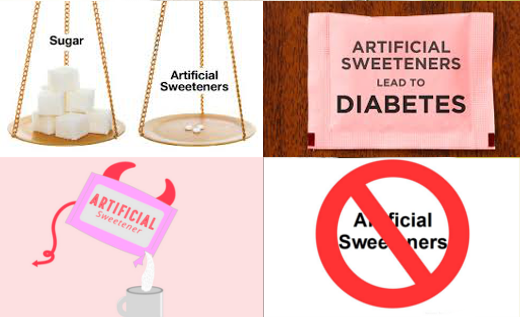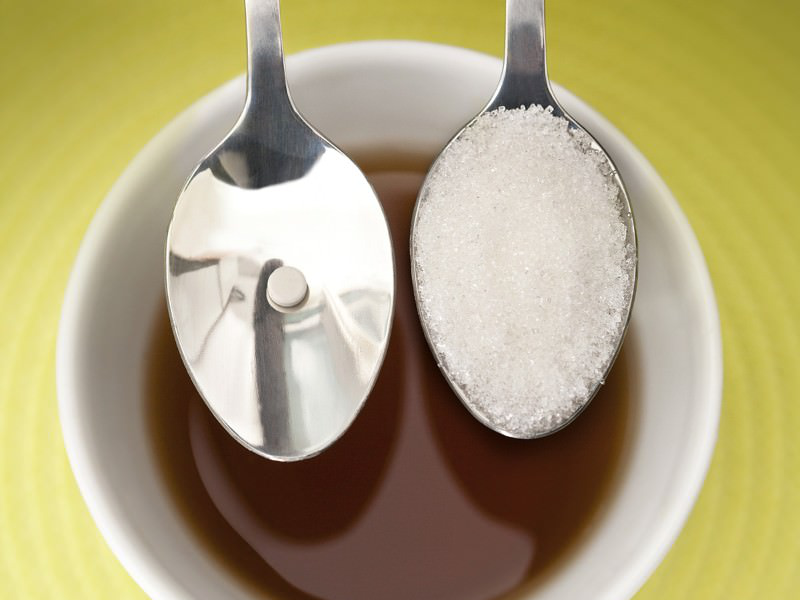The bitter truth about artificial sweeteners.
It’s no secret that a diet high in sugar is linked to increasing obesity rates, diabetes, heart disease and many other inflammatory diseases. And a government initiative to curb consumption is certainly a step in the right direction:
“Today nearly a third of children aged 2 to 15 are overweight or obese and younger generations are becoming
obese at earlier ages and staying obese for longer. Reducing obesity levels will save lives as obesity doubles the risk of dying prematurely. Obese adults are seven times more likely to become a type 2 diabetic than adults of a healthy weight which may cause blindness or limb amputation. And not only are obese people more likely to get physical health conditions like heart disease, they are also more likely to be living with conditions like depression.”

monisation of one food ingredient in which we risk opening the flood gates for other alternative yet potentially more dangerous substitutes to infiltrate the British diet unchallenged in its place.
Artificial sweeteners such as aspartame (NutraSweet, Equal), sucralose (Splenda), saccharin, acesulfame potassium, neotame, and various other synthetic sweeteners all cause serious health problems as concluded by scientific evidence in a variety of ways. And the evidence is strong that they all dramatically contribute to diabetes and weight gain.
Don’t be fooled by the myth that artificial sweeteners of zero calorie value can be part of a ‘healthy weight loss diet.’ Predominantly because most sweeteners no matter what the calorific value still stimulate sweet receptors in the body leading to weight gain and in recent studies diabetes. Calories are merely measurements of energy and there is currently no substantial scientific evidence that supports the calorie counting hypothesis, as all calories are used differently in the body depending upon their carbohydrate value. It’s time to drop the mythology.
One study showed that consumers of artificial sweeteners had a 53% higher incidence of abdominal obesity and a 2.6cm larger waist than those who did not. (2) , (3)
A more concerning issue is the way in which artificial sweeteners effect the
‘ microbiome’ (the 100 trillion organisms that live in our gut ). Corruption of gut bacteria by artificial sweeteners decreased satiation, after food, alters the regulation of chemicals that effect our mood and causes gut dysbiosis and digestive issues. (4) This is of particular concern for diabetics as there is a strong link between diabetes and imbalanced gut flora. Studies show a marked difference between diabetics and non diabetics in gut flora. (5)
Artificial sweeteners have been associated with weight gain and diabetes and have an unhealthy impact on gut flora according to one study. Shifting bacterial make up in the gut leads to glucose intolerance. (6)
Of the most concern is aspartame also known as E951, a genetically modified, multi potential carcinogen. It has been linked to endocrine problems, bloating, obesity, and diabetes. A known neurotoxin, it has been strongly linked to neurological problems including depression. Studies found that it compromises the central nervous system.
“Every molecule of aspartame produces a molecule of ethanol” Dr Woodrow C Monte Ph.D RHD Former Director of the Food Science and nutrition laboratory, Arizona State University , Tempe, Arizona 85287 ( 7)
Still of concern to human health; Saccharin, although the evidence is not as strong, linking saccharin to bladder cancer, in rats, long term use in humans is not yet fully known, but can cause allergic reactions in some people and reported side effects include: skin issues, headaches, nausea and diarrhea. Made from coal tar: saccharin is commonly manufactured by combining anthranilic acid (used among other things as a corrosive agent for metal) with nitrous acid, sulfur dioxide, chlorine, and ammonia. Chlorine and ammonia are not common food ingredients you would want to find in anyone’s cupboards and should be viewed with caution.
Sucralose
This additive is marketed under the brand name Splenda. Sucralose is basically denatured sucrose. Its preparation involves chlorinating sucrose, chemically changing the structure of the sugar molecules by substituting three chlorine atoms for three hydroxyl groups. Chlorine is a known carcinogen.
Furthermore, it’s worth considering; replacing cane sugar for another more synthetic substitute never really addresses the real problem of sugar addiction. Keeping your sugar addiction alive with synthetic substitutes misses the point entirely, replacement impostors never allow you to escape your unhealthy attachment to the sweet taste. Consider; Whatever you need owns you. So, in the case of the sweet stuff , until you are totally off the wagon, your craving will always have control over you and it’s just as easy in a moment of yearning to slip in our discipline and be tempted back to the nearest sugary snack when a healthier or synthetic alternative is not available.
‘Diet’ drinks and foods are mostly a waste of money and fall short of their promises, in the spirit of respecting your body, being healthy and clean, ditch the replacement, train your palette to enjoy natural sweetness such as low gi fruit. Wake your taste buds up enjoy natural sweetness.
Footnotes : (references)
(1) https://www.gov.uk/government/publications/childhood-obesity-a-plan-for-action/childhood-obesity-a-plan-for-action
(2) http://journals.plos.org/plosone/article?id=10.1371/journal.pone.0167241
(3) https://www.ncbi.nlm.nih.gov/pmc/articles/PMC5120853/
(4) https://www.ncbi.nlm.nih.gov/pmc/articles/PMC4615743/
(5)http://articles.mercola.com/sites/articles/archive/2010/03/02/diabetes-alert-your-gut-microflora-may-be-out-of-balance.aspx
(6) https://www.newscientist.com/article/mg22329872-600-artificial-sweeteners-linked-to-glucose-intolerance/
(7) (Journal of Applied Nutrition Volume 36, Number 1. 1984)
Further information and studies ;
http://www.greenmedinfo.com/toxic-ingredient/artificial-sweeteners






Leave a Reply
You must be logged in to post a comment.